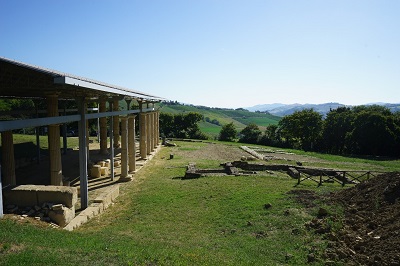Monte Rinaldo (FM)
Archaeological research in the late-republican Sanctuary

Archaeological mission director
Enrico Giorgi
Fieldwork coordinators
Francesco Belfiori, Paola Cossentino, Francesco Pizzimenti
Research Area and ERC Panels
Archaeological disciplines from prehistory to the Middle Ages; SH6: The study of the human past: archaeology, history, and memory (12 Level III)
Mission Activation date and duration
Project active since 2016
Overview
The remains of the sanctuary of Monte Rinaldo (FM) are located midway along the Aso river valley in an archaeological park known as ‘La Cuma’ which was excavated and partially reconstructed in the 1950-60s. The complex dates to the 2nd – 1st century BC and centres on a Tuscanic temple surrounded by a porticoed area flanked by a sacellum.
Since 2016 the site has been the focus of a new research programme led by the University of Bologna Department of History and Culture, the British School at Rome, the Soprintendenza Archeologia Belle Arti e Paesaggio delle Marche and the Municipality of Monte Rinaldo. The first phase of work focused on a review of the documentation about the site that was held in archives covering a period of over 60 years. This phase of work also included a systematic study of the previously excavated architectural clay decorations. In mid-June 2016 a first field campaign of non-invasive archaeology was undertaken though a geophysical (GPR, magnetometry) and topographic survey (GPS, laser scanning, photogrammetry) with the aim of assessing the potential for further buried remains and to document the various architectural structures. Therefore, new archaeological campaigns were carried out in 2017-2019 and in 2021 to offer a more precise interpretation of the monument (architecture, construction phases) as well as its broader historical and cultural context, with the study of cultic and religious dynamics involved in the attendance of the sanctuary.
Fieldwork Period
excavation activities take place between the end of June and the end of July.
Information for Students
stratigraphic excavation; topographical surveys of the investigated areas; study of finds and artefact; restoration (in agreement with the University of Bologna Restoration Labs, Ravenna campus); surveys and landscape archaeology of the surrounding areas of the sanctuary.